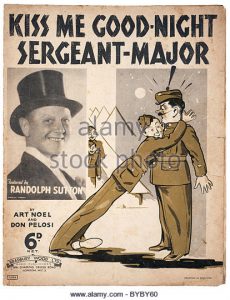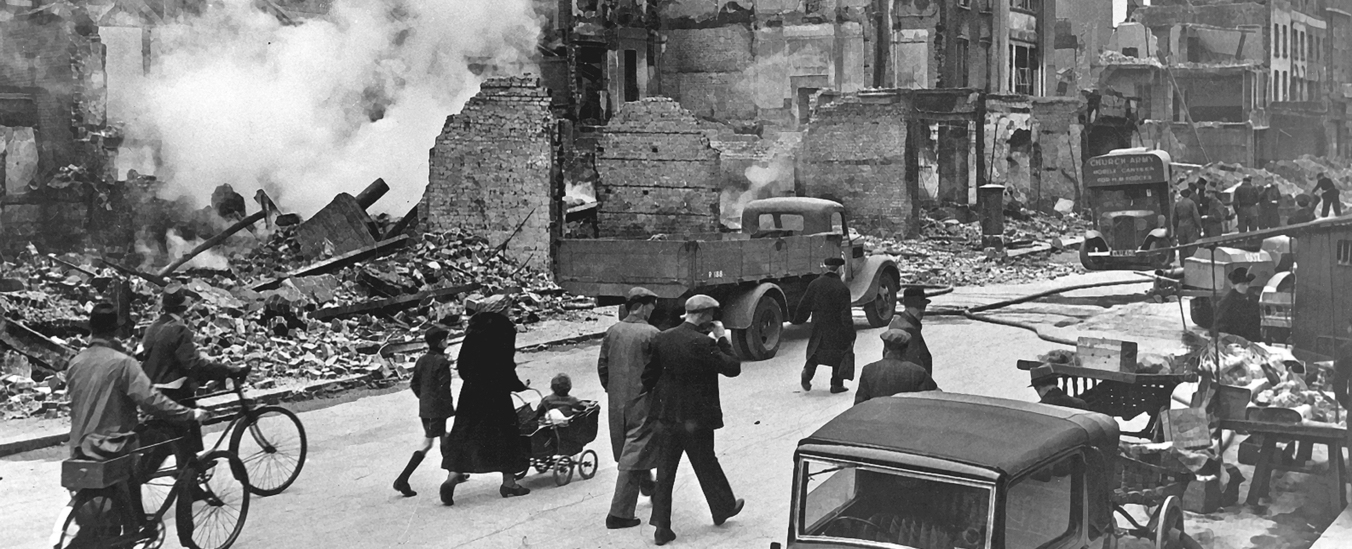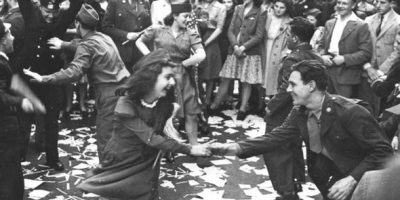OVERVIEW
“Kiss Me Goodnight, Sergeant Major” is an English song written in 1939 and is considered a WWII soldier’s song. Though this piece is written by Art Noel and Dan Pelosi, The most famous recording is by Arthur Askey, as well as many others including The Friends of Fiddler’s Green on their This Side Of The Ocean album, Vera Lynn, George Formby, Chas & Dave, Sod’s Opera, Len Luscombe, Elsie Carlisle and Max Bygraves, whom were all famous for their work during the second world war.
The Lyrics to “Kiss Me Goodnight, Sergeant Major” are as follows:
Private Jones came in one night
Full of cheer and very bright
He’d been out all day upon the spree
He bumped into Sergeant Smeck
Put his arms around his neck
And in his ear he whispered tenderly…..
Kiss me goodnight, Sergeant-Major
Tuck me in my little wooden bed
We all love you, Sergeant-Major,
When we hear you bawling, “Show a leg!”
Don’t forget to wake me in the morning
And bring me ’round a nice hot cup of tea
Kiss me goodnight Sergeant-Major
Sergeant-Major, be a mother to me
Kiss me goodnight, Sergeant-Major
Tuck me in my little wooden bed
We all love you, Sergeant-Major
Even when your neck grows rather red
Don’t forget to wake me in the morning
And bring me ’round a nice hot cup of tea
Kiss me goodnight, Sergeant-Major
Sergeant-Major, be a mother to me
THE ASKEY RECORDING
This particular recording was sung by Arthur Askey, who was accompanied by Billy Cotton & His Band (vocal: Alan Breeze). I think the Arthur Askey Recording might’ve been the most famous recording because it was very entertaining and sounds very playful, as it is very whimsical and follows different rhythms and vocals throughout. It first starts off on a short patriotic note and is then followed by Arthur Askey singing different parts of the song in different tones and also accompanied by acapella and a change in music to fit every whim.
I found the song to be quite catchy, not to mention the flow of it makes you want to tap your feet or snap your fingers- maybe even both. There is an especially funny part that starts at 1:53, in which Arthur Askey slurs his words and mixes up a few letters, which contributes to the comedic nature of the song.
OTHER FINDINGS/ CONCLUSION
Upon doing some further research on this piece, I found the image below:
 (
(
The illustration, by Randolph Sutton, corresponds to the rather unusual lyrics of the song because it depicts a soldier cuddling up to a sergeant major. Both the illustration and lyrics of this song are unlike and unexpected behavior from a sergeant and his troop. It’s almost as if the sergeant major has to pacify every little need of the soldier, kind of like a mother to her child, as the last lyric suggests, which makes both the song and the illustration seem a bit bizarre.
Along with this image I also discovered that some people were taught this song when they were younger/ in primary school (courtesy of YouTube comments section). It also seems to be a favorite for people who were from or have family from that era. This discovery along with the illustration, the nature of the lyrics and Arthur Askey (a comedian) as one of the recorders, I suspect the purpose of this song was meant to lift spirits during wartime, due to its wit and comedy.
*In 1940, there was also a follow up of this song titled “Good Morning Sergeant Major”*.







Melissa Dinsman
Interesting discussion of this song, particularly the reading of the relationship between soldier and officer. I also found it interesting that people would have learned this song as children. This post left me with some questions though: 1) What did you find out about Askey? Was he a popular comedian? How would he have been known? Was this song popular? Also, what do the lyrics tell you about the life of a soldier?